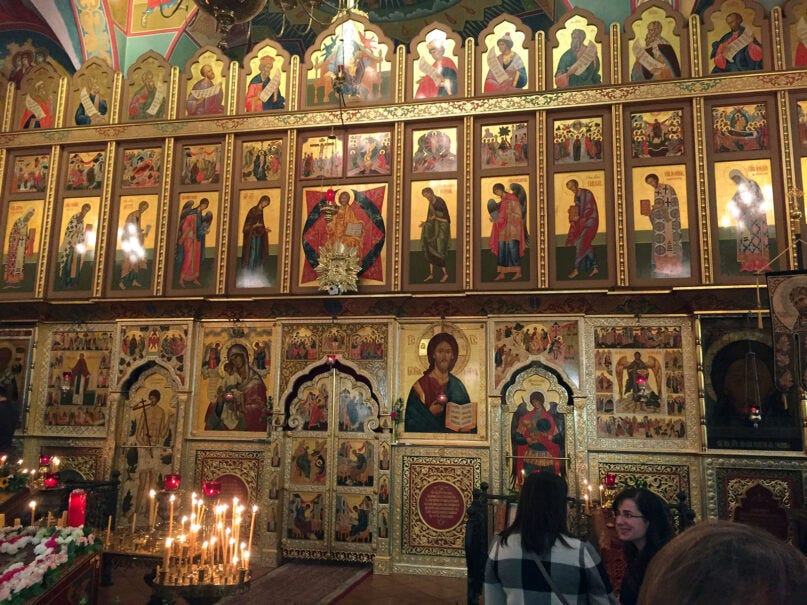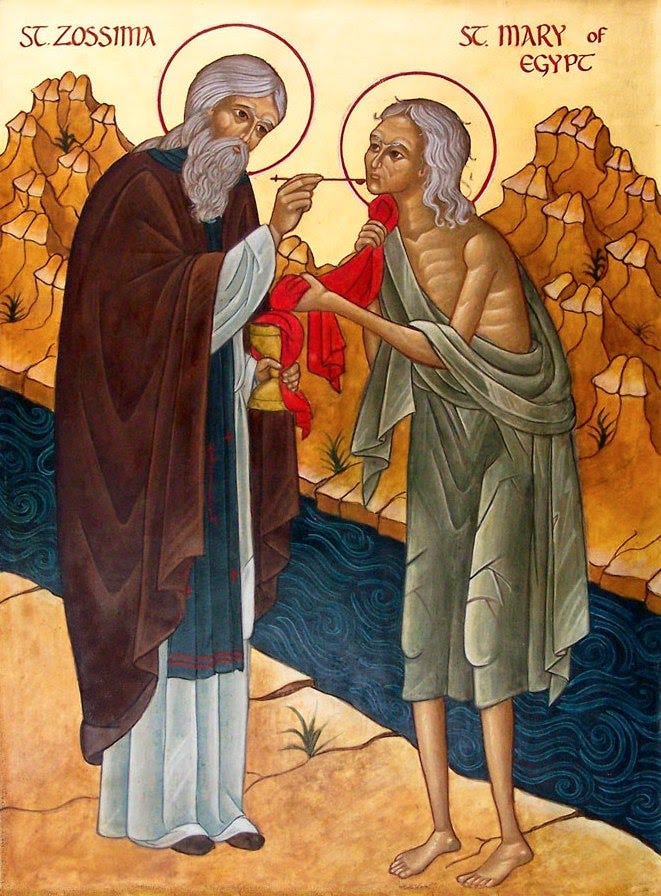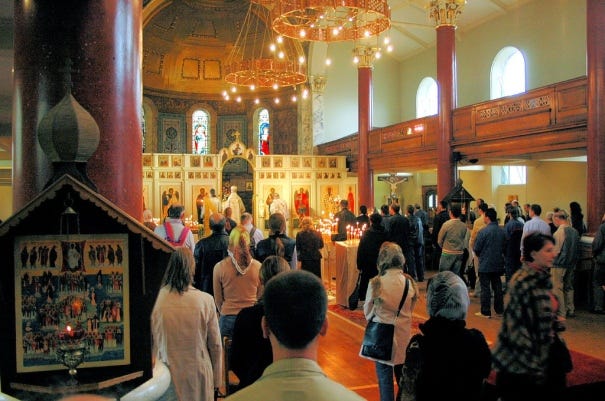“Keep in mind God's precept that states, 'Judge not, and you will not be judged' (Lk. 6:37), and in no way meddle in the lives of others.”
St. Symeon the New Theologian
Isaiah 40:18-31
To whom then will you liken God, or what likeness compare with him? The idol! a workman casts it, and a goldsmith overlays it with gold, and casts for it silver chains. He who is impoverished chooses for an offering wood that will not rot; he seeks out a skilfull craftsman to set up an image that will not move. Have you not known? Have you not heard? Has it not been told you from the beginning? Have you not understood from the foundations of the earth? It is he who sits above the circle of the earth, and its inhabitants are like grasshoppers; who stretches out the heavens like a curtain, and spreads them like a tent to dwell in; who brings princes to nought, and makes the rulers of the earth as nothing. Scarcely are they planted, scarcely sown, scarcely has their stem taken root in the earth, when he blows upon them, and they wither, and the tempest carries them off like stubble. To whom then will you compare me, that I should be like him? says the Holy One. Lift up your eyes on high and see: who created these? He who brings out their host by number, calling them all by name; by the greatness of his might, and because he is strong in power not one is missing. Why do you say, O Jacob, and speak, O Israel, “My way is hid from the LORD, and my right is disregarded by my God”? Have you not known? Have you not heard? The LORD is the everlasting God, the Creator of the ends of the earth. He does not faint or grow weary, his understanding is unsearchable. He gives power to the faint, and to him who has no might he increases strength. Even youths shall faint and be weary, and young men shall fall exhausted; but they who wait for the LORD shall renew their strength, they shall mount up with wings like eagles, they shall run and not be weary, they shall walk and not faint.
Genesis 15:1-15
After these things the word of the LORD came to Abram in a vision, “Fear not, Abram, I am your shield; your reward shall be very great.” But Abram said, “O Lord GOD, what wilt thou give me, for I continue childless, and the heir of my house is Elie’zer of Damascus?” And Abram said, “Behold, thou hast given me no offspring; and a slave born in my house will be my heir.” And behold, the word of the LORD came to him, “This man shall not be your heir; your own son shall be your heir.” And he brought him outside and said, “Look toward heaven, and number the stars, if you are able to number them.” Then he said to him, “So shall your descendants be.” And he believed the LORD; and he reckoned it to him as righteousness. And he said to him, “I am the LORD who brought you from Ur of the Chalde’ans, to give you this land to possess.” But he said, “O Lord GOD, how am I to know that I shall possess it?” He said to him, “Bring me a heifer three years old, a she-goat three years old, a ram three years old, a turtledove, and a young pigeon.” And he brought him all these, cut them in two, and laid each half over against the other; but he did not cut the birds in two. And when birds of prey came down upon the carcasses, Abram drove them away. As the sun was going down, a deep sleep fell on Abram; and lo, a dread and great darkness fell upon him. Then the LORD said to Abram, “Know of a surety that your descendants will be sojourners in a land that is not theirs, and will be slaves there, and they will be oppressed for four hundred years; but I will bring judgment on the nation which they serve, and afterward they shall come out with great possessions. As for yourself, you shall go to your fathers in peace; you shall be buried in a good old age.
Proverbs 15:7-19
The lips of the wise spread knowledge; not so the minds of fools. The sacrifice of the wicked is an abomination to the LORD, but the prayer of the upright is his delight. The way of the wicked is an abomination to the LORD, but he loves him who pursues righteousness. There is severe discipline for him who forsakes the way; he who hates reproof will die. Sheol and Abaddon lie open before the LORD, how much more the hearts of men! A scoffer does not like to be reproved; he will not go to the wise. A glad heart makes a cheerful countenance, but by sorrow of heart the spirit is broken. The mind of him who has understanding seeks knowledge, but the mouths of fools feed on folly. All the days of the afflicted are evil, but a cheerful heart has a continual feast. Better is a little with the fear of the LORD than great treasure and trouble with it. Better is a dinner of herbs where love is than a fatted ox and hatred with it. A hot-tempered man stirs up strife, but he who is slow to anger quiets contention. The way of a sluggard is overgrown with thorns, but the path of the upright is a level highway.
Venerable Mary of Egypt
Saint Zosimas (April 4) was a monk at a certain Palestinian monastery on the outskirts of Caesarea. Having dwelt at the monastery since his childhood, he lived there in asceticism until he reached the age of fifty-three. Then he was disturbed by the thought that he had attained perfection, and needed no one to instruct him. “Is there a monk anywhere who can show me some form of asceticism that I have not attained? Is there anyone who has surpassed me in spiritual sobriety and deeds?”
Suddenly, an angel of the Lord appeared to him and said, “Zosimas, you have struggled valiantly, as far as this is in the power of man. However, there is no one who is righteous (Rom 3:10). So that you may know how many other ways lead to salvation, leave your native land, like Abraham from the house of his father (Gen 12:1), and go to the monastery by the Jordan.”
To continue reading click: Venerable Mary of Egypt
No One Is Saved Alone
Fr. Stephen Freeman
Roughly 25 years ago I quit smoking. I never think about it now – it has become a thing of the distant past. But I can remember a period of about 10 years in which I struggled to quit. I would make up my mind, throw things away, make a clean sweep, and be back puffing away before the day was over. I felt completely frustrated with the efforts and disappointed with myself. It was not a secret addiction, everyone who saw me could see the young tobacco addict helplessly killing himself. I made jokes about it (as I usually do about almost everything). But year after year the habit continued and every attempt at quitting failed. On a couple of occasions I managed to stay quit for as much as two weeks. Collapsing after such a herculean effort is deeply shaming.
Something changed when I was approached by a faithful Christian couple after a weekend retreat. They were grateful, they said, for the ministry I had offered that weekend and wanted to do something for me. I was flattered and assured them that they didn’t need to. But they had something serious in mind. They told me that they thought my smoking hurt my ministry. I felt the blood rushing to my face as my embarrassment mounted. I felt a lecture coming on. But none came.
They said to me that they didn’t mean to cause me any embarrassment or concern, but that they wanted to offer a fast for me. One day each week they were going to fast and pray for God to give me the grace to quit. And, they added, they absolutely did not mean to put pressure on me.
I thanked them and told them how many times I had quit and failed and said, “If God can take them away, then so be it!”
And that was the end of it, or so I thought. I heard nothing more from them (they lived in a different city). I puffed away day after day with no particular concern or care for what they were doing. But about six months later, Great Lent rolled around. And, per usual, it seemed right to “give up smoking for Lent.” Most years that meant a miserable Ash Wednesday and a guilty collapse by the end of the day. But that year I quit. One day, two days, three days. It was hard. I was miserable. I was frequently angry. Day after day for the first few weeks my will would collapse. But I didn’t smoke.
As the season went forward it was like watching someone else quitting. I was doing something and had no sense of how I was doing it. That didn’t mean it was easy. I was doing something that had always been impossible and I didn’t know how.
At some point, I remembered the couple. I couldn’t remember their names. They were just two more faces from a retreat who made an audacious promise. I never saw them again. I couldn’t remember whom to write in order to thank them. So I gave thanks to God and continue to do so.
That experience was probably my first initiation into the mystery of salvation. We are not saved alone. God delights in communion. He delights in sharing His life.
Almost every version of grace and salvation I had heard up until that time, seemed quite private and was incorrectly called “personal.” Anything that is truly personal is not at all private. Personal existence means to exist in the image of the Divine Persons of the Holy Trinity. The Father does not exist apart from the Son and the Holy Spirit (the name “Father” would have no meaning in such an existence). The same is true of the other Persons within the Trinity. And if this is true of the Divine Persons, how much more must it be true for us?
And if our existence is not apart from others, then how could our salvation be any different? My experience was not without effort. But neither was it the result of my effort. Some couple, whose names I had forgotten, offered up one day a week as a sacrifice and offering for my sake. Strangers quit smoking for me.
I have read descriptions from the lives of Holy Elders in which some monk labored long in fasting and prayers, in vigils and tears, praying for the salvation of the whole human race. In a few extraordinary descriptions, those prayers were offered, not with a generic sense of “everybody,” but with an overwhelming awareness of the whole human race, person by person. It is a mystical participation in the Cross of Christ.
We tell the stories of our lives centered primarily in ourselves. This happened. I read this book. I met this man. I…I…I…I. All the while some stranger prays from the depths of Hades in union with Christ for us and for our salvation. I do not know how I became Orthodox. I thought about it for twenty years. I loved it from a distance and was repelled by it up close. It was just the same when I dealt with God. Theology is wonderful from a distance.
We are not saved alone. Salvation is the will of God for everyone and everything (2 Peter 3:9). And many have united themselves already to the will of God. And like the will of God, they become part of our salvation.
“It is not good for man to be alone.” “Good” is not something that can be had “alone.” Thank God we are saved from it.
This week’s calendar reminders:
Monday 3/31: Lenten Matins 8:30 a.m.
Tuesday 4/1: no services or events
Wednesday 4/2: Presanctified Liturgy 6:30 pm (potluck meal to follow)
Thursday 4/3: no matins; Canon of St.Andrew 7 p.m.
Friday 4/4: Paraklesis to the Theotokos 8:30 am
Saturday 4/5: Catechumen Class 4:30 pm; Choir Rehearsal 4:30 pm; Great Vespers 6 pm
Sunday 4/6: Divine Liturgy 9:15am;
CLICK BELOW to donate online:
Christ the Savior Orthodox Church is located in Southbury, Connecticut, and is part of the New England Diocese of the Orthodox Church of America.
Mailing address: Christ the Savior Church, 1070 Roxbury Road, Southbury, CT 06488
PLEASE DONATE to help our parish do the work of the Lord, thrive and grow, and extend the Kingdom of God. May the Lord bless your generosity!
Fr. Moses Locke can be reached at frmoseslocke@gmail.com











